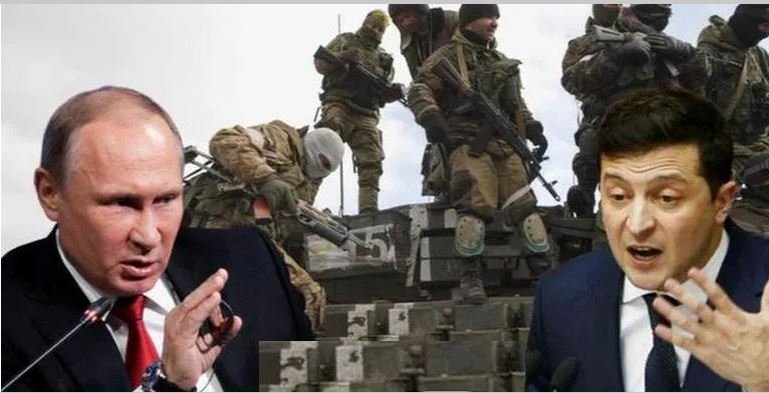
Russia announced a ceasefire Saturday to allow residents of two Ukrainian cities that were surrounded by Russian forces, including the strategic port city of Mariupol, to evacuate.
Russian forces have been operating in Ukraine since February 24.
As of Friday night, no fewer than 775 Nigerians had been flown back to the country. The first batch comprising 415 persons arrived from Romania in the morning while the second batch, comprising 180, arrived from Poland at about 6:30 pm. Another 180 arrived in the third batch.
They were all received at the Nnamdi Azikiwe International Airport, Abuja. One more batch was being expected from Hungary and Poland as of the time of filing this report.
Here are the latest developments in Russia’s war in Ukraine:
– Ceasefire in two cities –
Russia’s defence ministry announces a ceasefire to allow civilians in the besieged port city of Mariupol and the town of Volnovakha to evacuate. Mariupol’s mayor Vadim Boychenko says evacuations will begin at 0900 GMT.
The strategic city of 450,000 people on the Azov Sea, which has suffered intense shelling, has been without electricity, food, water and heating for days in the depth of winter.
– Nuclear plant fire –
A fire at Europe’s biggest nuclear power station at Zaporizhzhia is put out, with Ukraine accusing Russia of “nuclear terror” in shelling the plant.
Russian troops later take over the site of the reactors, which generate a fifth of Ukraine’s electricity, after firefighters say they were prevented from reaching the blaze for hours.
– West slams ‘recklessness’ –
At a United Nations Security Council meeting, the US ambassador Linda Thomas-Greenfield says Russia’s “reckless” overnight attack “represents a dire threat to all of Europe and the world”.
Moscow’s UN ambassador Vassily Nebenzia denies that Russian forces had shelled the plant, saying the statements “are simply untrue”.
Rafael Grossi, director general of the International Atomic Energy Agency, offers to travel to Ukraine to negotiate with Ukraine and Russia on ensuring the safety of nuclear sites.
– More talks planned –
One of Ukraine’s negotiators says a third round of talks with Russia on ending the fighting is planned this weekend.
Russian President Vladimir Putin in a phone call with German Chancellor Olaf Scholz says Moscow is ready for dialogue over Ukraine if all its demands are met
– Jail threat to journalists –
Award-winning Russian newspaper Novaya Gazeta says it will stop reporting on the war and the BBC says it is suspending the work of its journalists in Russia as President Vladimir Putin signs a law imposing harsh jail sentences for the publication of “fake news” about the invasion.
– ‘Not over soon’ –
US Secretary of State Antony Blinken warns that the war in Ukraine “may not be over soon” and that the US and European allies must sustain tough pressure on Russia until it ends.
– G7 threatens further sanctions –
G7 foreign ministers warn that Russia will face further “severe sanctions” for its invasion, and call on Moscow to stop its attacks near nuclear power plants.
– NATO rejects no-fly zone –
NATO chief Jens Stoltenberg says the alliance will not impose a no-fly zone over Ukraine after Kyiv calls for one to help stop Russia’s bombing of its cities.
– Russia isolated –
Russia is more isolated than ever after a historic vote at the UN Human Rights Council for a probe into violations committed during the war on Ukraine, with only Eritrea siding with Moscow.
– 47 killed in northern city –
Forty-seven people have been killed following a Russian air strike in the northern Ukrainian city of Chernihiv, regional authorities say.
– ‘Numerous rapes’: Kyiv –
Ukraine’s foreign minister claims there have been “numerous cases” of Russian troops raping Ukrainian women and calls for an international tribunal on war crimes.
– More than 1.2 million flee –
More than 1.2 million people have fled Ukraine into neighbouring countries since Russia invaded last week, the UN says.
– Stocks sink, gas, oil soar –
Global stock markets fall, gas prices reach a record high, and oil prices soar as investors fear the risk of an escalation after Russia attacked the nuclear power plant.
– Hunger threat –
The United Nations’ World Food Programme warns about a looming food crisis in Ukraine in conflict areas, while disruptions in production and exports could lead to food insecurity globally.
Copyright PUNCH.
All rights reserved. This material, and other digital content on this website, may not be reproduced, published, broadcast, rewritten or redistributed in whole or in part without prior express written permission from PUNCH.
Contact: [email protected]













